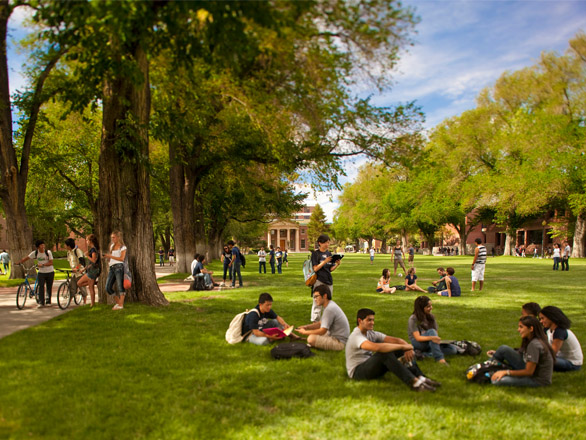Your student's wellbeing is our top priority
Welcome to the parent's home page. Below, we have gathered some of the most popular information for parents. Please take a look around and be sure to contact us if you can't find what you're looking for.
Living on campus is the best decision for your student if you want them to:
- Earn a higher grade point average than students living off-campus
- Be more likely to enroll in coursework the following year than students who live off campus
- Meet more people and make more friends
- Be more satisfied with their college experience
- Be more likely to earn a higher grade point average
- Be more likely to obtain a baccalaureate degree in 4 years
- Be more involved in academic and extracurricular activities
*per national/University research
What our residents say about us
"I like living in the residence halls because it makes me feel more connected to the campus by living here!!!"
Josh MacEachern - Las Vegas, Nevada
Resources available for your student
- Resident Assistants and Community Assistants: At least one RA/CA lives on each floor on campus and serve as leaders and resources for residence hall students. RAs/CAs can refer students to other departments and services on campus, mediate roommate conflicts, and support your students' academic and personal success.
- Academic mentors: Eight academic mentors live throughout the residence halls and provide academic services and resources for students such as tutoring, academic support programs, and academic planning and registration assistance.
- Counseling Services: Counseling services provides psychological services to UNR students to support and facilitate their personal and academic success and development. They have appointments available (both individual and group sessions) as well as resources online.
- Tutoring Center: Services include one-on-one appointments, NV PASS, walk-in labs, and small group sessions.
- Math Center: Provides tutoring, 40 station computer lab, midterm and final review sessions, graphing calculator rentals.
- Writing Center: Supports writers at all levels, helps with work at any stage of writing, help with academic and personal projects, appointments, and online resources.
- Academic Advising: General advising and major-specific advising is available for students.
- Financial Aid and Scholarships: Information regarding scholarships, grants, work study, loans, and more is available at the Office of Financial Aid & Scholarships.
- Disability Resource Center: Request accommodations and learn about resources.
- The Center for Student Cultural Diversity: Provides support for all students in their academic and social success with an emphasis on students that self-identify as African America, Asian American/Pacific Islander, American Indian, Hispanic/Latino, First-Generation, Income-Qualified, Multiracial/Biracial, and Lesbian, Gay, Bisexual or Transgender (LGBT).
Tips for parents
Communicate with your student. The Family Educational Rights and Privacy Act (FERPA) does not allow University officials to share any part of a student's records or similar information with the exceptions of emergencies. It is important that your student be the primary source of information you receive regarding issues involving their education, including the department of Residential Life, Housing, and Food Services. This skill helps build trust and respect between both parties involved.
Listen to your student when they have concerns and offer both a listening ear and encourage your student to utilize the resources and services available to them on campus. There are a variety of departments and offices that are dedicated to helping students succeed both academically and personally. See a list of resources here. (Link to Resources Available for Your Student)
Is your student homesick?
- Encourage your student to remain on campus or in the Reno area for the first six weeks of the semester. Research shows this is a critical timeframe for students to integrate into their new college environment, get involved on campus, and develop social groups.
- Encourage your student to get involved on campus! There are clubs, activities, and student groups to fit almost any interest! No club interests them? They can create their own with 9 friends through our student government - the Associated Students for the University of Nevada (ASUN) .
- The Counseling Center is a good resource for students experiencing homesickness at a higher level. This is a healthy option for managing all types of stress.
Is your student experiencing roommate/suitemate conflicts?
- Encourage your student to speak to their roommate/suitemate about the issues occurring. A proactive approach of discussing "small" issues as they happen can minimize larger issues later. Help your student understand that sometimes compromise is necessary in order for successful living environments. These discussions build valuable skills your student will need throughout their adult life.
- Ask your student if they have communicated their concerns with their Resident Assistant/Community Assistant (RA/CA). These staff members are trained in roommate mediations, conflict, homesickness, and more to better assist each student living in the residence halls.
- In more serious roommate/suitemate issues that involve safety concerns, encourage your student to speak with their Resident Director (RD) or Graduate Resident Director (GRD).
Is your student struggling academically?
- Encourage your student to attend their instructor's office hours for individual help.
- Encourage your student to seek out the resources available to them on campus:
- Ask your student to contact the Disability Resource Center if they need academic accommodations.
